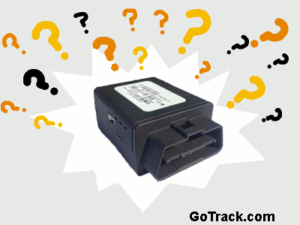Small Business Questions About GPS Fleet Tracking
Most small business owners immediately understand the potential benefits installing a fleet tracking system brings their operation. These include improved logistics, protection against equipment loss, proof of

driver conduct and more. However, many business owners also have questions. What if employees use their personal vehicles for work or are allowed to take their work vehicle home? Can I afford this? Do I need special equipment or training? Is this all just more trouble than it is worth? We’ll answer a few questions in this article, but first a few disclaimers. We aren’t lawyers and some states have their own laws regulating GPS system usage. Talk with your lawyer if you have specific questions.
Is Fleet Tracking Even Legal?
Yes, it is legal to put GPS trackers on vehicles you own in the United States. Installing fleet tracking units on company owned vehicles is legal in all fifty states. However, some states, such as California, require you to inform employees if and when they are tracked. At GoTrack, we recommend that employers always let drivers know if company owned vehicles have GPS trackers. It really is in their best interest (especially if you use information about their current location for dispatching).
Things are a bit more complicated if a business allows their employee to take work vehicles home. Issues can arise if an employee is tracked outside of work hours, especially if they are allowed to drive the vehicle for personal use. Another complication occurs if your employees use their personal vehicles for work. For example, you may run a restaurant and wish to track your delivery drivers, who drive their own cars. Consider using the GoTrack EZ unit, which simply plugs into a vehicle’s OBD II port. They can be easily plugged in at the beginning of a shift and unplugged and turned in at the end of a shift. This way, you can track and dispatch your drivers as necessary while they are working but not when they are off duty.
Is Fleet Tracking Practical?
GoTrack GPS trackers are extremely practical. Once they are installed you simply log into the website to begin tracking (it may take a few minutes for a newly installed unit to register). Installation is easy. The GoTrack EZ just plugs into the OBD-II port. All gas powered consumer vehicles in the United States since 1996 are required to include an OBD-II port. Diesel vehicles and some other commercial trucks may not be able to use the GoTrack EZ, but it only takes three simple connections to hardwire the 3-wire unit into a vehicle.
Once installed, all GoTrack devices are easily monitored through any device that browses the Internet. Your laptop, smartphone, favorite tablet, smart TV… anything you use to surf the web can access your GoTrack fleet tracking data. You can also set up alerts so you do not have to constantly monitor your trackers. Instead, you receive emails or texts when events occur. That means you can even monitor your fleet with your smartwatch! The web based system allows you to set up the reports you want, divide your fleet as you see fit, create new users, rename units and more. You are in control. There is no need for specialized monitoring equipment, dedicated servers or waiting for customer support to implement your changes. All you need is a web connection and your password and you are in complete control of your system.
But Is It Affordable?
The simple answer is yes. Installation costs are minimal. Your units require a data plan because that is how they report their position back to the you. However, there are no hidden or additional costs with GoTrack for roaming or excessive usage. There are no additional infrastructure costs, either. You monitor GoTrack trackers over the Internet using devices you already own such as smartphones and laptops.
However, you must also consider the value GoTrack GPS fleet tracking brings your business when trying to establish the real bottom line. In some ways, the GoTrack system is an insurance policy. Obviously, it can help you recover stolen vehicles and equipment. The information you collect protects you in other ways as well. Information on vehicle speed and location, for example, could help you defend against frivolous lawsuits or accusations of fault after an accident. Some businesses even use their tracking reports to streamline their billing and payroll procedures. Reports from the system can also be used to track necessary vehicle maintenance, simplifying fleet management responsibilities.